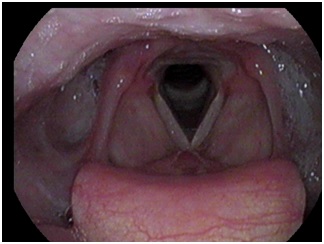Treating the Chronically Sore Throat
 |
Abie Mendelsohn, M.D. Assistant Professor of Otolaryngology Director of the Head & Neck Robotic Surgery Program About the author: Dr. Mendelsohn attended the David Geffen School of Medicine at UCLA after graduating Magna Cum Laude from Yeshiva University in New York. Here at UCLA, Dr. Mendelsohn quickly focused on voice and throat disorders and ultimately devoted an entire year towards the in-depth study of voice disorders. He continued his training in the Otolaryngology – Head & Neck Surgery residency program at UCLA where he was ultimately awarded for his teaching in the role of Chief Resident. |
As a laryngologist, or a throat specialist, one of the most common reasons that bring patients into my office is a constant sore throat. This sore throat might be described as a slight irritation, or a feeling of something stuck in the throat, or frequent throat clearing (cough) which does not bring up any mucus.
Commonly, the endoscopic examination of these symptoms shows an irritated voicebox, or larynx. This condition is called “chronic laryngitis” and it must be examined because many more serious conditions have the same type of throat symptoms. In order to improve the symptoms of chronic laryngitis we must identify and reduce the source of irritation.
Irritation of the voice box most commonly results from stomach acid reflux or nasal mucus drip, or a combination of both. Patients without heartburn can have stomach acid reflux up to damage the voicebox. Patients without chronic sinusitis can have nasal mucus drip down from the back of the nose to damage the voice box.
Many patients can begin to feel improvement within the first few months after starting first-line stomach acid medication. I will recommend a three-month trial of stomach acid medication for all patients with chronic laryngitis. Along with first-line acid treatment, patients with chronic laryngitis who note either intermittent or constant nasal drip should also receive a topical nasal steroid and begin daily sinonasal saline irrigations.
It is not very clear how acid reflux and nasal drip are related. We do know that sometimes the reflux can cause the nasal drip. Other times the nasal drip will be the causative factor that makes the reflux symptomatic. This uncertainty has been the target of many medical studies, but this question is quickly becoming equally frustrating as trying to figure out if the chicken or egg came first. However, by improving the two main sources of voice box irritation we have seen excellent success in improving the lives of patients with chronic laryngitis.

Figure: Endoscopic view of a chronically irritated voicebox. Blanching behind the vocal folds and pooled saliva beside the vocal folds underscore the severity of irritation.
(9952)
Louie Lanza liked this on Facebook.
Doug Spackman liked this on Facebook.
Neil Cheng liked this on Facebook.
LM Hall liked this on Facebook.
Carl Farris liked this on Facebook.
Hélène Jobidon liked this on Facebook.
I thought it was something else
Claire Austin liked this on Facebook.
Teresa Williams liked this on Facebook.